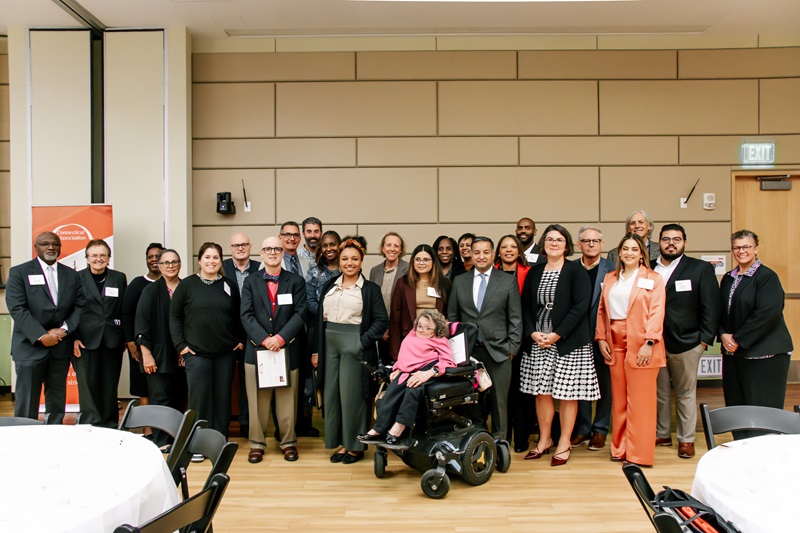 |
| Representatives of the organizations in Connecticut who have signed on to the Connecticut legal community’s Diversity and Inclusion Pledge & Plan were presented with certificates of recognition at the end of this year's summit. |
The Connecticut Bar Association hosted its 2025 Diversity, Equity, and Inclusion (DEI) Summit on October 24 at CT State Community College’s Gateway campus in New Haven, marking the 10th annual summit held since 2016. Over 150 attendees, including signatory organizations of the Connecticut legal community’s Diversity and Inclusion Pledge, gathered for the summit to hear from the event’s prestigious speakers, who provided presentations focused on reflection, planning, and strategic conversations about the state of DEI in Connecticut. Since its inception, the DEI Summit has served as a central forum for legal professionals to evaluate progress, share best practices, and strengthen cross-sector collaboration in advancing diversity, equity, and inclusion throughout Connecticut’s legal system.
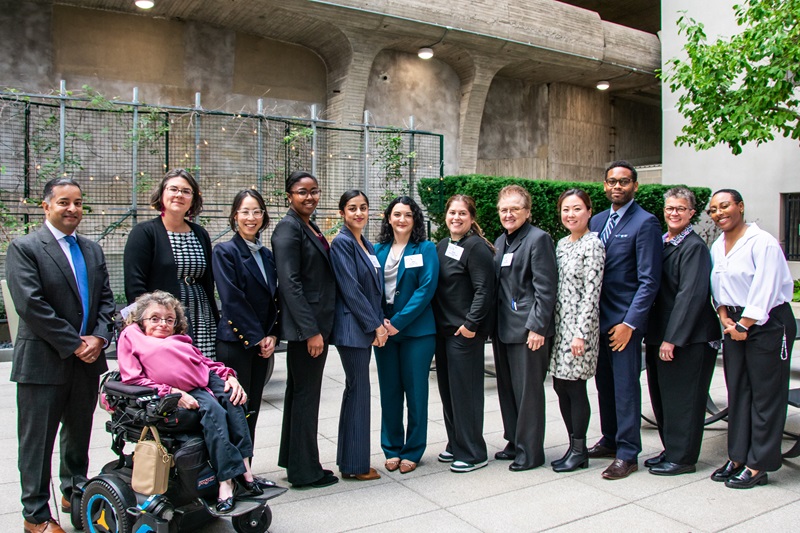 |
| Diversity, Equity, and Inclusion Summit Committee Members: (From L to R) CBA DEI Summit Committee Chair Hon. Cecil J. Thomas, Michelle Duprey, CBA President Emily A. Gianquinto, CBA Director of Access to Justice & Equity Song Kim, CBA DEI Committee Co-Chair Mallori D. Thompson, Jasjeet Sahani, Olta Shkembi, Jody L. Walker Smith, Alix Simonetti, CBA Executive Director Lina Lee, Troy M. Brown, Hon. Karen L. Demeola, and CBA Community Engagement Lead Kiarra Lavache |
The Summit began with welcome remarks provided by CBA President Emily A. Gianquinto. “Whether you are joining us for the first time or you have been part of our journey since 2016, thank you very much for being here,” stated President Gianquinto as she addressed the audience. “Your presence speaks volumes about your commitment to building a more inclusive and equitable legal profession in our state.” She continued by noting that the summit provides a vital space in an increasingly challenging time where attendees can “…come together to reflect, learn, and act.”
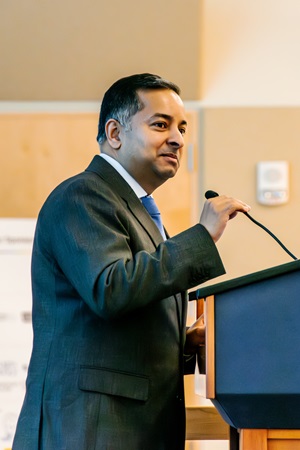 |
|
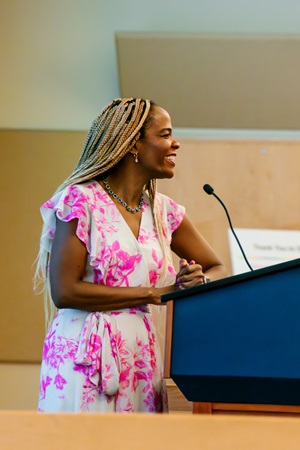 |
| Judge Cecil J. Thomas presented the summit's annual Signatory Data Collection Overview. |
|
Michelle Silverthorn led the summit’s interactive workshop, From Barriers to Breakthroughs: Designing Equity. |
As in previous years, the first substantive program of the summit featured Judge Cecil J. Thomas presenting the annual Signatory Data Collection Overview. He provided the summit’s attendees with aggregated demographic trends and diversity metrics organized by employer type and legal sector. Among his findings, Judge Thomas pointed out that overall diversity decreases when comparing demographics in associate level positions with those of more senior stakeholders at firms, highlighting the need for increased DEI focused retention strategies. He also noted that Connecticut currently falls behind the national average for diversity in the legal profession.
Workplace culture strategist Michelle Silverthorn led the summit’s interactive workshop, From Barriers to Breakthroughs: Designing Equity, during which attendees examined systemic barriers and root causes related to inherent biases and developed plans for practical solutions to create positive changes. She asked attendees to participate in several exercises that revealed and addressed their unconscious inclinations and biases related to race and gender. “At the core of diversity are people, people who are very different,” stated Silverthorn. “We have different identities, religions, cultures, sexual orientations, and backgrounds and we speak different languages, and we come from different generations, and every single one of us counts. Every one of us.”
 |
|
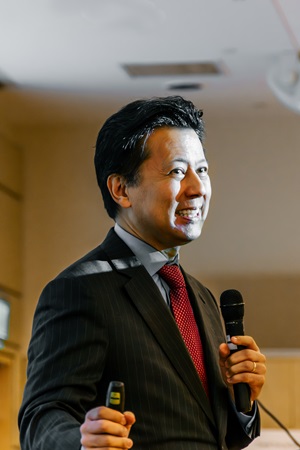 |
| Wesleyan University's Dr. Khalilah L. Brown-Dean presented the session Lessons from the Past, Prospects for the Future: Roots, Routes, and Realities. |
|
New York University's Professor Kenji Yoshino presented the session How Equality Wins. |
The summit’s third program, Lessons from the Past, Prospects for the Future: Roots, Routes, and Realities, was presented by Wesleyan University’s Dr. Khalilah L. Brown-Dean. Using a historical lens, she traced the roots of DEI efforts in the United States to show how they shape the legal and social realities of today. She particularly focused on the idea that DEI efforts are not new but have instead been a key aspect of the development of the United States since its founding. “Diversity Equity and Inclusion in its fullest sense should be a central issue for the legal profession,” stated Dr. Brown-Dean. “And the reason for that is because I believe the health of our democracy depends on the public’s faith that the law belongs to all of us. Not just some of us.”
Returning from last year’s summit, New York University’s Professor Kenji Yoshino once again discussed the various political and legal ramifications of maintaining, expanding, or restricting DEI initiatives. He emphasized that, while the current administration has attempted to tamp down DEI efforts made by private companies and firms, the legality of such programs remains virtually the same as it was a year ago. Professor Yoshino also pointed out that when organizations withdraw their DEI programming, they can incur serious risks ranging from discrimination lawsuits to public backlash.
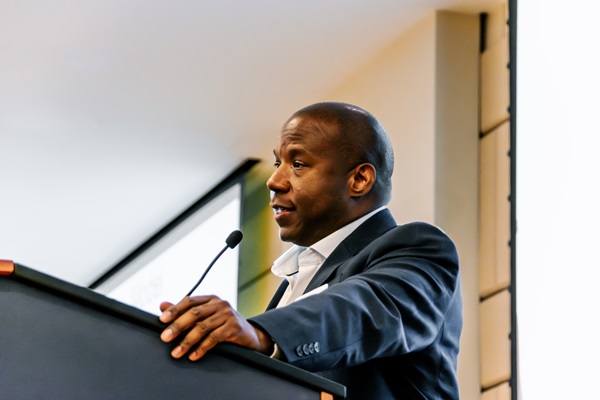 |
| Dr. Robert W. Livingston provided the final presentation of the Summit, It's Time to Pivot: Pathways to BIPOC Empowerment. |
The final presentation of the summit was provided by Harvard University’s Dr. Robert W. Livingston, who focused on the central concepts detailed in his newest book, Play the Game. Change the Game. Leave the Game.: Pathways to Black Empowerment, Prosperity, and Joy. Dr. Livingston argued that America experiences white supremacy as an addiction, with white American society exhibiting periods of cultural “sobriety” and “relapse” in terms of popular sentiment towards racial and equity issues. He advised that Black Americans have several effective methods to approach this situation: “playing the game” (working within mainstream white systems), “changing the game” (challenging the status quo in an effort to upend white supremacy), and “leaving the game" (carving out new spaces not dominated by a culture of white supremacy). Expanding on these concepts, Dr. Livingston stated, “You can play the game, leave the game, you can leave the game and change the game. So an example might be James Baldwin moving to France so that he was in a less oppressive environment, so that he could write some of his most revolutionary works. And you can play the game to change the game.”
Following the summit’s presentations, President Gianquinto distributed certificates of recognition to the organizations in Connecticut who have signed on to the Connecticut legal community’s Diversity and Inclusion Pledge & Plan. CBA DEI Committee Co-Chair Mallori Thompson then provided the summit’s closing remarks. “Our purpose is clear, and we have the means to make it happen,” stated Attorney Thompson. “So the challenge is to remain energized and focused on ensuring our efforts translate into meaningful change and into full participation for everyone until the next generation can walk into the workplace without ever knowing that they were once ‘inferior.’”
The summit reflects the significant efforts of the CBA Diversity, Equity, and Inclusion Committee, and in particular its Summit Subcommittee, over the course of the past year. The CBA extends its gratitude to the Diversity, Equity, & Inclusion Summit Committee members for organizing such an engaging event for this year.
View more photos from the 2025 DEI Summit.